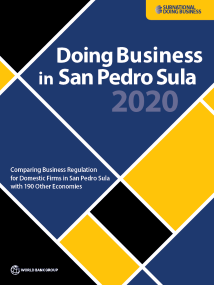Overview
Doing Business in San Pedro Sula 2020 is the first subnational Doing Business study covering exclusively San Pedro Sula, the second most populous and largest business city of Honduras. It benchmarks the regulatory environment for businesses in four areas: starting a business, dealing with construction permits, registering property and enforcing contracts. The aim of this exercise is to advance business regulatory reforms. Findings of the study provide valuable inputs to improve the ease of doing business in the city and support all levels of government in their initiatives to reform.
Main findings
- A regional study Doing Business in Central America and the Dominican Republic 2015 generated preliminary data for the city of San Pedro Sula in 3 of those 4 regulatory areas.
- San Pedro Sula outperforms the average economy in Latin America and the Caribbean when it comes to dealing with construction permits and registering property, and it is on par with the region in enforcing contracts. However, it falls short in starting a business.
- Compared globally, San Pedro Sula scores above average only on the ease of registering property.
- On a national level, there are performance gaps between San Pedro Sula and Tegucigalpa on all the indicators. These gaps tend to be wider for the two indicators for which the municipality plays a more important role—starting a business and dealing with construction permits. Tegucigalpa scores better in the former category; in the latter, San Pedro Sula does better.
- Entrepreneurs in San Pedro Sula have to go through many steps to start a business (11 procedures) and obtain a construction permit (17).
- On a global scale, San Pedro Sula has room to improve on the quality indices—for example, in the use of new technologies, final quality control over construction projects, geographic coverage of the land registry or cadastral system and users’ access to information. Regulatory quality depends to a large extent on national regulations, but local governments also play an important role.
- There is still room to streamline business regulations and procedures for entrepreneurs. Continue improving the coordination among entities would strengthen the business enabling environment in the city.

